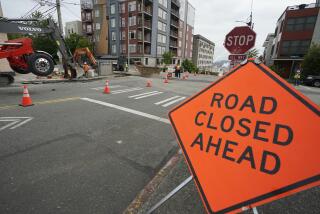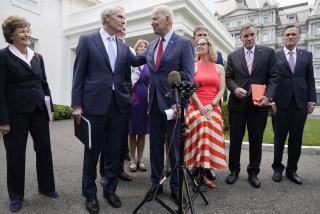Infrastructure building is historically cheap. Why has it stopped?
- Share via
Via Twitter, Erik Brynjolffsson of MIT posts a graph similar to the one above and asks:
“Why is public construction plummeting? a)no workers available b)interest rates too high c)nothing worth fixing d)??”
The answer, of course, is d. There is no logical explanation for infrastructure spending collapsing at a time when interest rates for municipalities are bumping along at historically low rates--at least the lowest since the 1960s.
William Selway and Brian Chappatta of Bloomberg tried this week to answer the same question, and emerged with the same imponderables. Age and inattention are turning bridges, highways, airports and water systems to dust across the nation, yet state and local officials resist taking advantage of cheap borrowing to get them fixed.
Even Herbert Hoover understood the value of using public resources to put people to work--it’s the reason he jump-started construction in 1931 of the dam that would bear his name. Today’s local Hoovers haven’t gotten the message.
Bloomberg’s reporters note that localities are using revenues to pay down existing borrowing, rather than incurring new debt even though the new borrowing could be used for projects that would improve their economies over time.
“When you’re trying to be frugal, it’s probably not the time to eat caviar,” they quoted Margaret Staggers, the head of the transportation committee of the West Virginia House. Staggers tried and failed to push through a $1-billion road repair bond. But that’s not caviar--it’s tuna salad, which would build a stronger West Virginia.
Some municipal officials say the resistance to infrastructure borrowing is a psychological hangover from the high-debt binge of earlier decades, but the truth is that the people who really profit from the scarcity of new borrowing are bond investors, whose sought-after holdings increase in value.
Everyone else loses because politicians have forgotten the meaning of investing for the future. They’re remember, eventually, but by then interest rates will be much higher, and they’ll be kicking themselves for missing out on a historic opportunity.
Keep up to date with The Economy Hub by following @hiltzikm.
More to Read
Inside the business of entertainment
The Wide Shot brings you news, analysis and insights on everything from streaming wars to production — and what it all means for the future.
You may occasionally receive promotional content from the Los Angeles Times.











